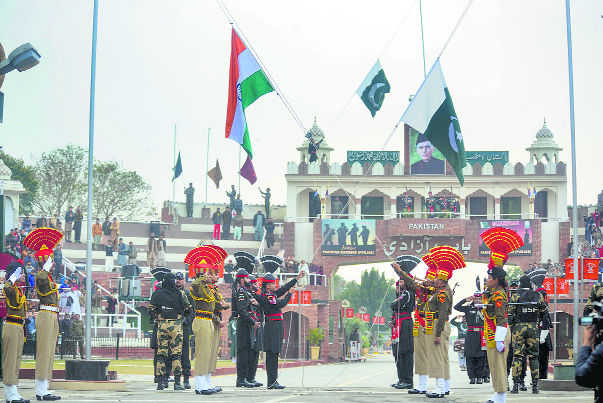
Harsh reality: Both India and Pakistan do not have the wherewithal in terms of arms and ammunition to last an intense battle.
COL MAHESH CHADHA (retd)
Defence commentator
THE very thought of resolving the Kashmir issue by military means without giving any solid solution — how, when and where — can be as hypothetical as a figment of somebody’s imagination. It must be remembered that in the three full-fledged wars (1947, 1965 and 1971) that Pakistan waged against India, any portion of Pakistan-occupied Kashmir (PoK) captured, gained or lost by India was either returned or agreed to be retained by Pakistan — Haji Pir Pass in 1965 and Chhamb in 1971. He who may try to extrapolate the Bangladesh template on PoK would be living in a fool’s paradise and misleading the masses. The geography of the two countries today would negate the possibility of any such foolhardy venture, its futility writ large.
While the erstwhile east Pakistan was thousands of miles from the mainland — across the Arabian Sea and the Bay of Bengal — the line of communication and logistics running through India, PoK is contiguous with a huge land mass, mostly mountainous, under-developed and sparsely populated, and so is the treacherous terrain of Gilgit, Baltistan and other northern areas, where there is heavy deployment of Pakistani troops deeply entrenched, facing Indian troops eyeball to eyeball at places along the LoC. They, too, have offensive formations located close by to undertake counter-measures. To dislodge any of the defended localities (held by a company strength of only about 100 men) that has been fortified by intensive minefields and other obstacles, would take at least a division with a highly established air superiority launching a wave after wave of brigade size force (3,000 men) spread over days, suffering heavy casualties, and that too depending on the campaign season lasting only three months of summer with unpredictable weather conditions and a total no-go in winters — when there is heavy snowfall.
While some troops, in their exuberance, consider it a once-in-a-lifetime dream being fulfilled, the Indian Army does not have the wherewithal in terms of arms and ammunition to last such an intense battle that is likely to continue for more than three weeks, and so is the state of Pakistan — despite it having guaranteed and continuous military and financial support of China. Thus, after the last bullet is fired, the only option left to both sides would be either to play ball or if too determined to stick to their unachievable mission, as a last resort to use nuclear weapons, who does it first is immaterial because whosoever does it will have to accept the colossal collateral damage caused to its own army and people who would be in close contact with each other in any tactical situation. But before all this happens, there is every likelihood of world powers intervening to bring both sides to the negotiating table and call it quits. By which time everything would be lost, the economy shattered, and people suffering. While India, because of its own indigenous production, would come back on its feet within some time, Pakistan would as usual be going around the world to bail it out.
Considering such a scenario unlikely, let’s examine how Indian governments, despite some raising the rhetoric of freeing PoK and saying that J&K belongs to India, have understood the impossibility and inwardly accepted PoK as a lost cause in history and decided to move on. Being seized on the one hand of the growing anti-India sentiment due to not acceding to the general will of the people (mainly Muslims in the Valley) and on the other the rehabilitation and return of Kashmiri Pandits to their homes with assured security, the government has handed over the task of bringing insurgency under control to the security forces under the unified command of the Army. In the ongoing wars in the Middle East and Afghanistan, even the mightiest of the world’s armies have failed, suffered losses of their own men and material and have either pulled out or are in the process of pulling out, leaving those countries to their fate — at the hands of the ISIS, Taliban etc. — in whose wake Islamisation forecasts a more dangerous future.
No doubt the Army has tried its best to assuage the feelings of the locals by running many projects for their betterment under the umbrella of Operation Sadbhavana, opened schools for the children and taken them around the country to see for themselves how different communities speaking different languages and having different cultures and faiths live together. But that is not recognised fully.
So, where do we go from here? Pakistan has an unfulfilled agenda in Kashmir and so do we. It is our integral part, where we have over the years invested so much in terms of men and material, shed blood for the cause of Kashmiriat, Insaniyat and Jamhooriat. If some self-willed political leaders speak of secession or dismemberment, we must ignore them for being sycophants serving their own purpose. The answer lies in continued diplomatic efforts, accepting the highs and lows of the ongoing situation. The Army must continue to carry out its mandate to bring the situation to a point where the government can take it forward for a permanent resolution of the imbroglio. The harsh reality is that neither can Pakistan annex any more in the Valley nor can we regain PoK.



























